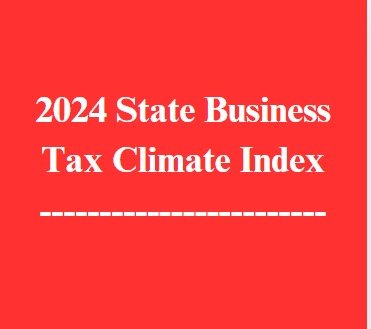The State Business Tax Climate Index is an essential reference for policymakers, who want to know how well state tax laws are conducive to or impede job-creating economic growth. The 2024 version of the company’s yearly report details how competitive business taxes are in all 50 U.S. States, and how effectively the U.S. tax systems work.
Understanding the Index
The index assesses five major areas of taxation:
- Corporate Taxes Dissects how income is taxed at the corporate level rates, structures, and compliance complexity.
- Individual Income Taxes Analyzes personal income tax systems that can impact pass-through entities, or small businesses that filing as pass-through entities.
- Sales Taxes Examines state and local sales taxes and their impact on consumer behavior and the ways businesses operate.
- Property Taxes Comprises taxes on property, real estate and other assets, evaluating their total burden on firms.
- Unemployment Insurance Taxes Reviews the structure and rates of taxation for unemployment insurance, which constitutes an important cost for employers.
The intention is to order states from highest to lowest based on their capacity to offer a clean, neutral and transparent tax system that leads to economic growth.
Key Highlights from the 2024 Index

- Top Performers: Wyoming, South Dakota and Alaska remain firmly planted at the top of the rankings thanks to their absence of big taxes, such as corporate income tax or an individual income tax. They are tax-efficient and the simplicity of their financial year ends and reporting is also attractive to every business.
- States with Challenges: New Jersey places last, followed by New York and California. Their tax codes are complicated, their rates are high, and the regulatory burdens create obstacles to businesses locating or expanding there.
- Notable Movers:
- Arizona was greatly enhanced by ongoing tax cuts that have lowered the rates on individual incomes.
- Arkansas improved after lowering corporate income tax rates and making compliance easier.
- Hawaii was slight because of changes to its property tax structure.
- Regional Trends:
- Midwestern and Mountain West states generally do better because of lower tax burdens and less tortured systems.
- Much of the variation comes from the fact that coastal states tend to have higher taxes especially true for states in the Northeast and on the West Coast which means they do not rank as high.
Why the Index Matters
The State Business Tax Climate Index is an important driver of the policy decisions states make regarding taxes. Here’s why it is important:
- Policy Reform: States apply the index as a measuring stick to recognize areas in need of improvement, enacting tax reforms to lure businesses.
- Business Decisions: Rankings are taken into account by corporations and small businesses when they’re looking to expand or relocate.
- Economic Growth: A more favorable tax climate can propel job creation, investment and economic competitiveness overall.
Emerging Trends in State Taxation
The 2024 index reveals a few trends in state taxation:
- Flat Income Taxes: As states migrate to simplicity and neutrality, more will adopt flat individual and corporate income tax rates.
- Digital Taxation: States struggle with how to fairly tax digital goods and services, as the economy moves toward e-commerce.
- Green Tax Incentives: A growing interest in sustainability across the country means many states are now giving tax breaks for investments in renewable energy.
Conclusion
Because tax policies are inextricably linked to economic competitiveness, the 2024 State Business Tax Climate Index illustrates why such change is necessary. Other states struggle to navigate the dual demands of generating revenue without stunting entrepreneurship, even as those like Wyoming and South Dakota set the bar with low tax burdens. These rankings and trends are critical for policymakers seeking to promote economic growth and attract investment amid intensifying global competition.

